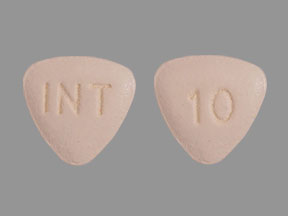Ocaliva Side Effects
Generic name: obeticholic acid
Medically reviewed by Drugs.com. Last updated on Dec 17, 2023.
Note: This document provides detailed information about Ocaliva Side Effects associated with obeticholic acid. Some dosage forms listed on this page may not apply specifically to the brand name Ocaliva.
Applies to obeticholic acid: oral tablet.
Important warnings
This medicine can cause some serious health issues
Oral route (tablet)
Warning: Hepatic Decompensation and Failure in Primary Biliary Cholangitis Patients with Cirrhosis. Hepatic decompensation and failure, sometimes fatal or resulting in liver transplant, have been reported with obeticholic acid treatment in primary biliary cholangitis (PBC) patients with either compensated or decompensated cirrhosis.Obeticholic acid is contraindicated in PBC patients with decompensated cirrhosis, a prior decompensation event, or with compensated cirrhosis who have evidence of portal hypertension.Permanently discontinue obeticholic acid in patients who develop laboratory or clinical evidence of hepatic decompensation; have compensated cirrhosis and develop evidence of portal hypertension; or experience clinically significant hepatic adverse reactions while on treatment.
Serious side effects of Ocaliva
Along with its needed effects, obeticholic acid (the active ingredient contained in Ocaliva) may cause some unwanted effects. Although not all of these side effects may occur, if they do occur they may need medical attention.
Check with your doctor immediately if any of the following side effects occur while taking obeticholic acid:
More common side effects
- fever
- severe itching skin
Incidence not known
Other side effects of Ocaliva
Some side effects of obeticholic acid may occur that usually do not need medical attention. These side effects may go away during treatment as your body adjusts to the medicine. Also, your health care professional may be able to tell you about ways to prevent or reduce some of these side effects.
Check with your health care professional if any of the following side effects continue or are bothersome or if you have any questions about them:
More common side effects
- bloating or swelling of the face, arms, hands, lower legs, or feet
- difficulty having a bowel movement
- difficulty with moving
- fast, irregular, pounding, or racing heartbeat or pulse
- muscle pain or stiffness
- pain in the joints
- rapid weight gain
- sore throat
- tingling of the hands or feet
- unusual weight gain or loss
Less common side effects
- skin rash, encrusted, scaly and oozing
For healthcare professionals
Applies to obeticholic acid: oral tablet.
General adverse events
The most commonly reported side effects include pruritus, fatigue, and abdominal pain/discomfort.[Ref]
Dermatologic
- Very common (10% or more): Pruritus (up to 70%), rash (up to 10%)
- Common (1% to 10%): Eczema
- Frequency not reported: Cholinergic urticaria, generalized pruritus, heat rash, macular rash, maculopapular rash, papular rash, prurigo, pruritic rash, skin eruptions, urticaria[Ref]
Pruritus occurred most frequently in patients given 10 mg than in patients titrated to 10 mg and in those given placebo; these patients were more likely to develop pruritus within the first month. Discontinuation due to pruritus was also more common in patients given 10 mg.
Severe pruritus includes skin eruptions, prurigo, pruritus, pruritus generalized, eye pruritus, ear pruritus, anal pruritus, vulvovaginal pruritus, and rash pruritus.
Rash includes urticaria, rash, rash macular/papular/maculopapular, heat rash, and urticaria cholinergic.[Ref]
Other
- Very common (10% or more): Fatigue (up to 25%)
- Common (1% to 10%): Pyrexia
- Frequency not reported: Asthenia, ear pruritus, tiredness[Ref]
Fatigue includes fatigue, tiredness, and asthenia.[Ref]
Metabolic
- Very common (10% or more): High-density lipoprotein-cholesterol (HDL-C) reduction (up to 20%)[Ref]
Gastrointestinal
- Very common (10% or more): Abdominal pain/discomfort (up to 19%)
- Common (1% to 10%): Constipation, oropharyngeal pain
- Frequency not reported: Abdominal tenderness, anal pruritus, ascites, gastrointestinal pain, lower abdominal pain, new/worsening ascites, upper abdominal pain, variceal bleeding[Ref]
Abdominal pain/discomfort includes upper/lower abdominal pain, abdominal pain, abdominal discomfort, abdominal tenderness, and gastrointestinal pain.[Ref]
Cardiovascular
- Common (1% to 10%): Palpitations, peripheral edema[Ref]
Nervous system
- Common (1% to 10%): Dizziness
- Frequency not reported: Hepatic encephalopathy, presyncope, syncope
- Postmarketing reports: New/worsening hepatic encephalopathy[Ref]
Dizziness includes dizziness, syncope, and presyncope.[Ref]
Endocrine
- Common (1% to 10%): Thyroid function abnormality
- Frequency not reported: Decreased free thyroxine, hypothyroidism, increased blood thyroid stimulating hormone[Ref]
Thyroid function abnormality includes thyroxine free decreased, blood thyroid stimulating hormone increased, and hypothyroidism.[Ref]
Musculoskeletal
- Common (1% to 10%): Alkaline phosphatase (ALP) increased, arthralgia[Ref]
Hepatic
- Frequency not reported: Hepatic decompensation, liver failure, liver-related adverse reactions
- Postmarketing reports: Increased direct bilirubin, increased total bilirubin, new onset cirrhosis, new/worsening jaundice[Ref]
Genitourinary
- Frequency not reported: Vulvovaginal pruritus[Ref]
Ocular
- Frequency not reported: Eye pruritus[Ref]
References
1. Cerner Multum, Inc. "UK Summary of Product Characteristics."
2. Cerner Multum, Inc. "Australian Product Information."
3. (2016) "Product Information. Ocaliva (obeticholic acid)." Intercept Pharmaceuticals, Inc.
Frequently asked questions
More about Ocaliva (obeticholic acid)
- Check interactions
- Compare alternatives
- Pricing & coupons
- Reviews (3)
- Drug images
- Latest FDA alerts (4)
- Dosage information
- During pregnancy
- FDA approval history
- Drug class: miscellaneous GI agents
- En español
Patient resources
Professional resources
Related treatment guides
Further information
Ocaliva side effects can vary depending on the individual. Always consult your healthcare provider to ensure the information displayed on this page applies to your personal circumstances.
Note: Medication side effects may be underreported. If you are experiencing side effects that are not listed, submit a report to the FDA by following this guide.

